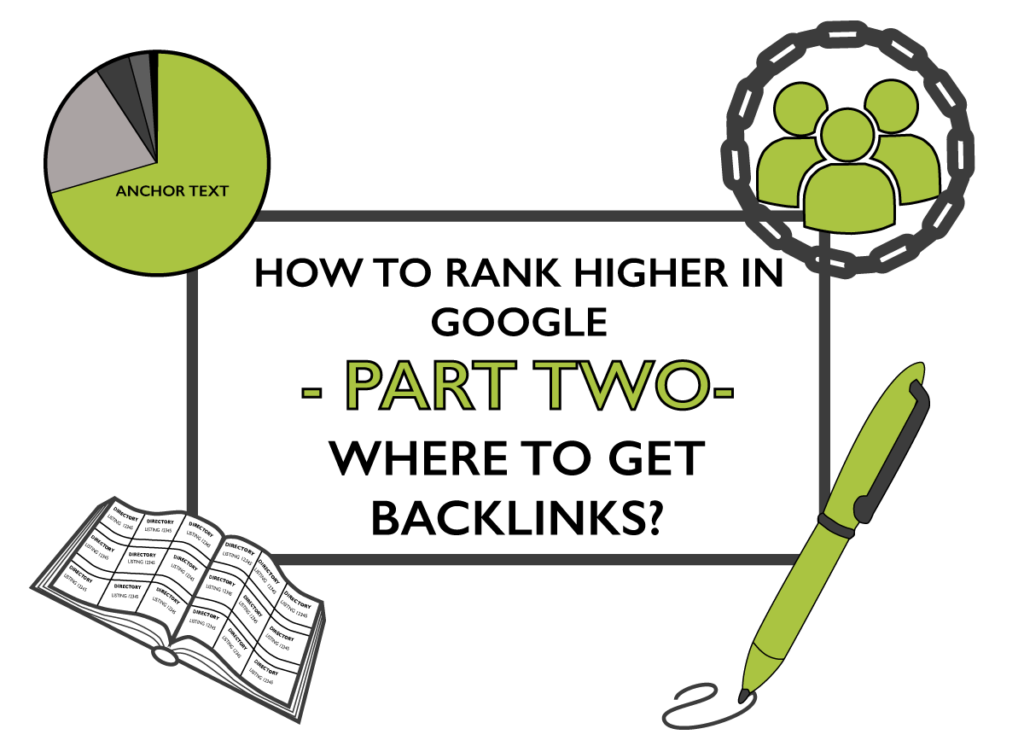Last time we talked about Backlinks and what they were, as well how they help you to rank. So you may now be thinking where to get backlinks and improve my overall rankings?
If you missed the first part you can find it here – How to rank higher in Google part 1
Where to get backlinks from?
Well if your content is good and you are promoting it on social media then you should start getting some organically. Unfortunately, Social Media Shares, Likes and popularity hold absolutely no value to search engine ranking, however, there are still a few places to collect backlinks for yourself. Here are the 5 simplest to gather:
1. Directories
Directories are easy to find and there a literally hundreds of thousands of them out there. Create a profile and of course a link to your site. If you can find niche directories that either focus on your geographical area or your industry, this will mean they are more relevant and therefore more powerful.
2. Blogs Comments

Some blogs don’t allow this and many give NoFollow links however there are still some that do. Find blogs that cover your industry and comment on their blog along with a link to your site. Do not spam though, make useful comments and make sure you fully read the article, and are actually contributing to the blog whether you agree with the content or not.
3. Editorial Links
Editorial Links are links your gain from writing off-site on a blogging platform. Sites such as Blogger offer a service where people can post their own articles to the site. Your name will be included with a link to your site in the editorial notes. These can often be quite useful and hold some good value as the site offering this often have high authority. This is not to be confused with Guest Blogging.
4. Forums
Like Blog Comments and Directories, the more relevant to your site the forum is, the more powerful the backlinks you gather will be. Actually contribute to the forum though, don’t use it as an advertisement and try to avoid ever selling your services. Just help people out or answer questions, have your site URL in your signature but avoid doing much more as you may get flagged for spam. Simply prove you are the fountain of knowledge in your industry.
5. Guest Blogging
This, like editorial links, is where you post a blog on someone else’s site as a guest blogger. This is different to editorial as you will generally be in communication with the site owner and therefore you can have full access to edits. Also, the blog will likely be in the same industry as you and therefore hold more power than an editorial link. These are the hardest links to get (unless you have a close personal friend with the authority sites handy), however, if your Blog Comments have been used fully the blog owner may recognise your knowledge and invite you to guest blog.
What about Anchor-Text?

Anchor-text is the text that makes up a link. Not to be confused with the link itself.
https://clockworkmoggy.com – This is a naked link with no anchor text.
Clockwork Moggy – Web Design, Branding and SEO – This is the same link with key-worded anchor text.
Anchor text used to be incredibly powerful as you could tell Google what a page was about before it even looked but with the last few Google updates this is no longer the case. Google has decided it doesn’t like to be told what to do and so now sites with too many backlinks using key-worded anchor text have be penalised for spamming. Now it is recommended to use either naked links (like the one shown above) or branded, where you use your company name as the anchor text.
Like this – Clockwork Moggy.
An optimum Anchor Link percentage was recently released to help people position their backlinks correctly.
- Branded anchor text: Such as your company name: 70%
- Naked link anchors: IE Images, or standard hyperlinks: 20%
- Generic anchors: IE ‘Click here’: 5%
- Latent Semantic Indexing, partial match anchors: IE synonyms of your main Keywords or Long-tail keywords: 1-5%
- Exact match anchor text: Your exact Keyword: less than 1%
With all this in mind make sure you are targeting the right sites. You should start to see an improvement in your rankings.
Don’t forget to check out our final blog in this series

